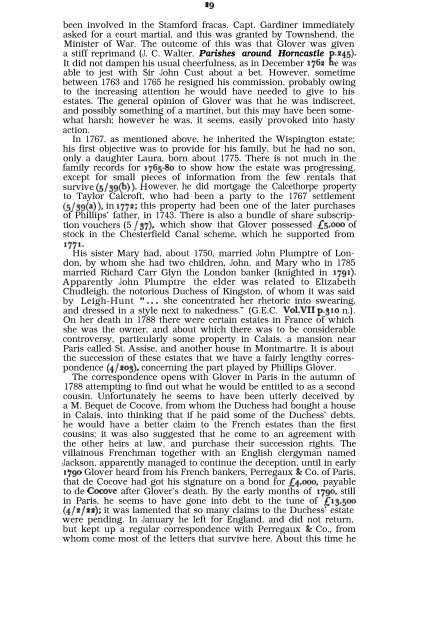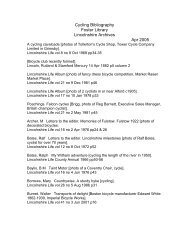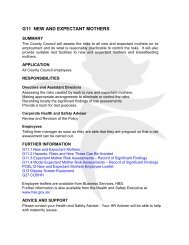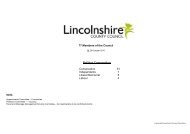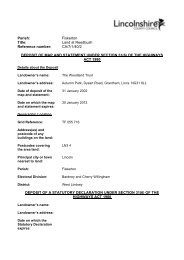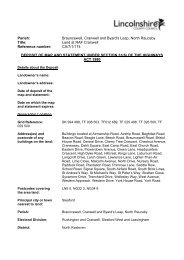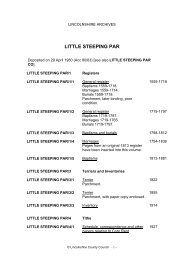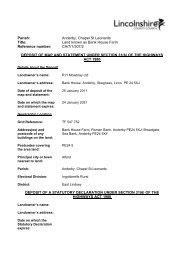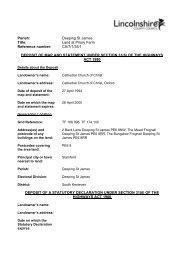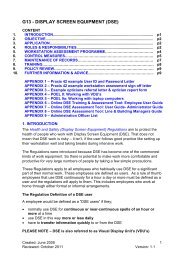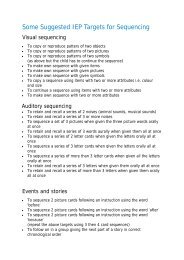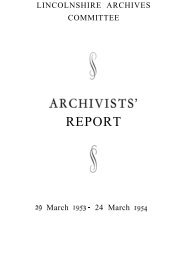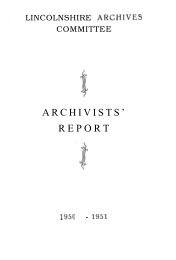Adobe PDF - Lincolnshire Archives Committee Archivists' Report 24 ...
Adobe PDF - Lincolnshire Archives Committee Archivists' Report 24 ...
Adobe PDF - Lincolnshire Archives Committee Archivists' Report 24 ...
Create successful ePaper yourself
Turn your PDF publications into a flip-book with our unique Google optimized e-Paper software.
=9<br />
been involved in the Stamford fracas. Capt. Gardiner immediately<br />
asked for a court martial, and this was granted by Townshend, the<br />
Minister of War. The outcome of this was that Glover was given<br />
a stiff reprimand (J. C. Walter, Parishes around Horncastle R 345).<br />
It did not dampen his usual cheerfulness, as in December 1762 e was<br />
able to jest with Sir John Cust about a bet. However, sometime<br />
between 1763 and 1765 he resigned his commission, probably owing<br />
to the increasing attention he would have needed to give to his<br />
estates. The general opinion of Glover was that he was indiscreet,<br />
and possibly something of a martinet, but this may have been somewhat<br />
harsh; however he was, it seems, easily provoked into hasty<br />
action.<br />
In 1767, as mentioned above, he inherited the Wispington estate;<br />
his first objective was to provide for his family, but he had no son,<br />
only a daughter Laura, born about 1775. There is not much in the<br />
family records for 176580 to show how the estate was progressing,<br />
except for small pieces of information from the few rentals that<br />
survive (5/39(b) ). However, he did mortgage the Calcethorpe property<br />
to Taylor Calcroft, who had been a party to the 1767 settlement<br />
(5/39(a) ), in 1772; this property had been one of the later purchases<br />
of Phillips’ father, in 1743. There is also a bundle of share subscription<br />
vouchers (5 / 37), which show that Glover possessed L5,ooo of<br />
stock in the Chesterfield Canal scheme, which he supported from<br />
1771.<br />
His sister Mary had, about 1750, married John Plumptre of London,<br />
by whom she had two children, John, and Mary who in 1785<br />
married Richard Carr Glyn the London banker (knighted in 1791).<br />
Apparently John Plumptre the elder was related to Elizabeth<br />
Chudleigh, the notorious Duchess of Kingston, of whom it was said<br />
by Leigh-Hunt “ . . . she concentrated her rhetoric into swearing,<br />
and dressed in a style next to nakedness.” (G.E.C. Vol.VII p.310 n.).<br />
On her death in 1788 there were certain estates in France of which<br />
she was the owner, and about which there was to be considerable<br />
controversy, particularly some property in Calais, a mansion near<br />
Paris called St. Assise, and another house in Montmartre. It is about<br />
the succession of these estates that we have a fairly lengthy correspondence<br />
(4/203), concerning the part played by Phillips Glover.<br />
The correspondence opens with Glover in Paris in the autumn of<br />
1788 attempting to find out what he would be entitled to as a second<br />
cousin. Unfortunately he seems to have been utterly deceived by<br />
a M. Bequet de Cocove, from whom the Duchess had bought a house<br />
in Calais, into thinking that if he paid some of the Duchess’ debts,<br />
he would have a better claim to the French estates than the first<br />
cousins; it was also suggested that he come to an agreement with<br />
the other heirs at law, and purchase their succession rights. The<br />
villainous Frenchman together with an English clergyman named<br />
Jackson, apparently managed to continue the deception, until in early<br />
1790 Glover heard from his French bankers, Perregaux & Co. of Paris,<br />
that de Cocove had got his signature on a bond for &4,000, payable<br />
to de &cove after Glover’s death. By the early months of 1790, still<br />
in Paris, he seems to have gone into debt to the tune of E13,500<br />
(4/a/34); it was lamented that so many claims to the Duchess’ estate<br />
were pending. In January he left for England, and did not return,<br />
but kept up a regular correspondence with Perregaux & Co., from<br />
whom come most of the letters that survive here. About this time he


